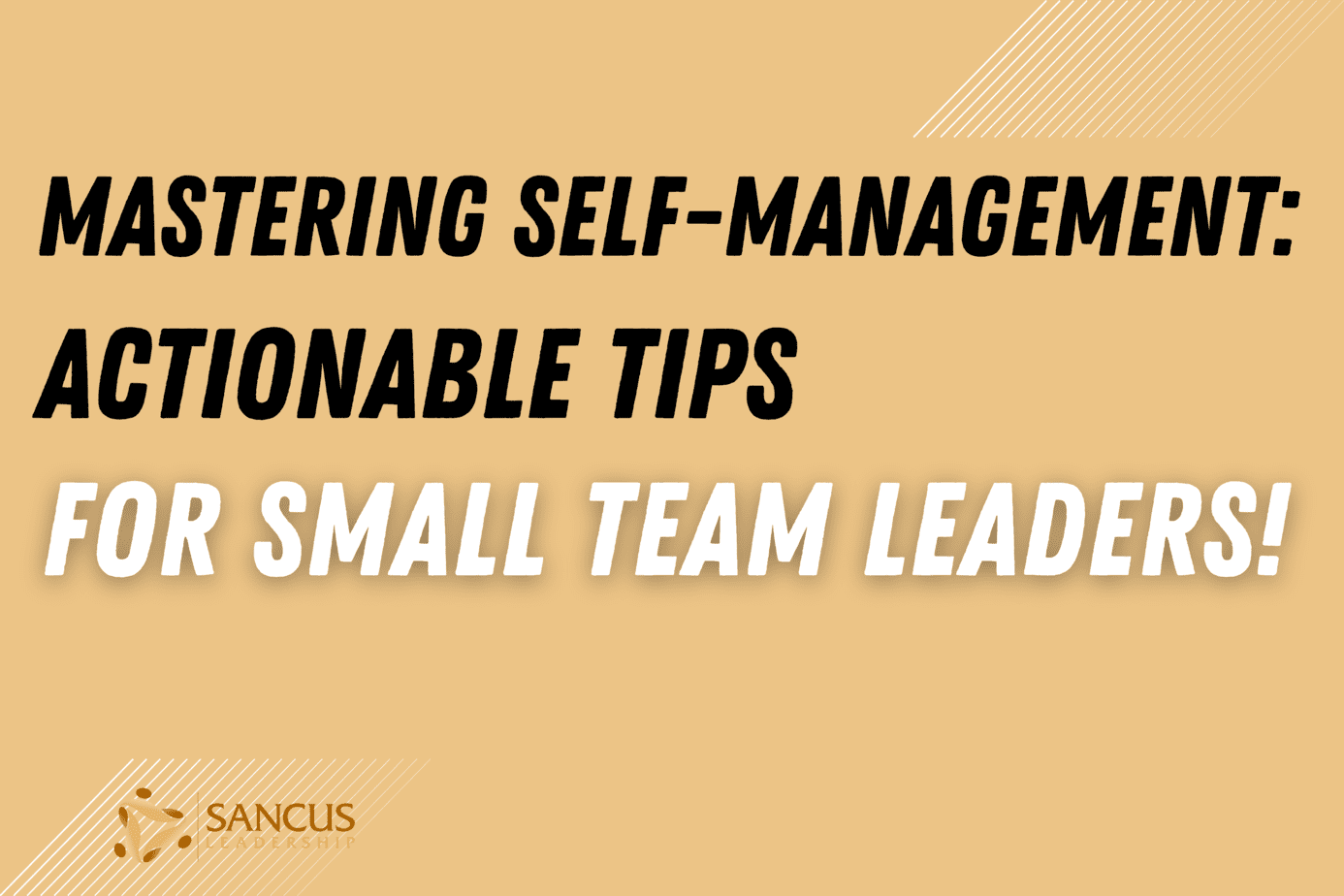A common mistake I see when working with team leaders is that they are so focused on organizing the company and their team that they forget about themselves. This often leads to a lack of trust and missed deadlines. You’re likely to have heard the terms “self-management” or “personal management,” but you might not know how fundamental skills they are for competent leaders. So what exactly is self-management?
Self-management entails skills relating to managing your time and tasks without needing outside input or assistance. Self-management is removing distractions, identifying what is important, and completely focusing on achieving it.
Want to learn how self and personal management affects your team and the bottom line? Keep reading to get all the information you need.
Self-Management Definition and Examples

Self-management (also known as personal management) is the process of managing yourself and taking accountability for your actions and work. Rather than relying on someone else to manage your workload and tell you what to do at all times, you can depend on yourself.
Even if you have a manager, it’s still essential to have self-management skills so that you can work successfully on your own and as a valuable team member.
Even if you have a manager, it’s still essential to have self-management skills so that you can work successfully on your own and as a valuable team member.
If each project member has self-management skills, delegating tasks will be easier. Less input from management will be required because everyone will be capable of looking after themselves.
In the military, we call this “Someone who can carry their own backpack.” It means that you can take care of your own stuff AND be a valued asset to the team.
Below are some examples of self-management:
Taking Full Responsibility for Your Work and Progress
First and foremost, self-management involves taking full responsibility for your work and progress rather than relying on someone else to take the heat if something goes wrong.
It also means you’re responsible for making progress with your tasks, so you must take accountability if you need to catch up in certain areas. In almost all jobs, people must take responsibility for their work and progress, which is why self-management in a professional setting is so important.
Let’s say you’re in a group project, and all your colleagues are ahead of you and hitting their targets. You, on the other hand, are falling behind and not meeting deadlines. In that instance, you need to take responsibility and ask yourself why you’re not meeting the same targets as your colleagues.
Rather than shifting blame, think about what you can do to improve your performance individually and as a team member–this might include reorganizing tasks or implementing better time management.
No matter the case, taking full responsibility for your work and progress is an excellent example of self-management.
Here's a great assessment on taking extreme ownership, where you can learn if you are taking or avoiding responsibility!
Setting Targets for Yourself
Setting targets for yourself is another example of self-management. Rather than relying on a manager or team member to give you a target or goal, you should be able to set one yourself.
Suppose you can successfully set targets for yourself. In that case, you’ll find it easier to set targets for others if you’re interested in taking on higher positions in the future (like higher management roles).
If you can successfully set targets for yourself, you’ll find it easier to set targets for others.
Not only that, but the target should be risky and achievable. When you set targets for yourself, you must stay committed to reaching them within the specified timeframe. This is especially important if you’re working in a team where failing to meet your targets will affect others.
Each time a large milestone is met, it’s good to celebrate in some way to promote further motivation and happiness in yourself and other team members.
Each team member should be capable of setting targets for themselves and reaching those targets to ensure everything runs smoothly.
If you want to know how to set goals that break boundaries without risking failure, download Sancus Leadership's goal-setting tool.
Being Able to Manage Your Time Accordingly
Time management is a vital aspect of self-management and a skill that every professional should have, no matter the industry.
Time management involves different things, including:
- Setting a specific amount of time for each task. You may have to deal with various tasks in a group project. In this scenario, the best thing to do is set a certain amount of time for each job to allow for better organization. I like to see this as a budget; the more important the task, the higher the budget is.
- Setting time aside for breaks (personal time). While you must get all your work done within a reasonable timeframe, setting time aside for rest or breaks is equally important. Allocating time for holidays allows you to recharge, reduces the risk of burnout, and improves performance over time.
- Understanding how long different tasks might take. Before managing time between tasks, you must have the ability to determine how long each one will take to complete. There’s no point in allocating insufficient time to a job or allocating too much time to one that doesn’t need it. Never give your employees The Impossible Task.
- Adjusting time frames where necessary. There’s no doubt that everyone makes mistakes now and then. For example, you might realize you didn’t allocate enough time for a particular task. In that instance, you should be able to recognize the issue and adjust the time frame.
Without proper time management, you risk producing poor-quality work and missing deadlines.
Being Organized and Punctual
Another aspect of self-management is being organized and punctual. Someone with good self-management skills should always keep their work organized to avoid a potential mess or confusion, mainly when working with a group of colleagues.
I struggle with this a lot. I hate maintenance, but I have learned that to move really fast, we sometimes need to slow down to improve or repair something and move even faster.
I hate maintenance, but I have learned that to move really fast, sometimes we need to slow down to improve or repair something, and then move even faster.
There are different ways one can be organized when managing and leading a project. Here are some examples:
- Having an efficient workspace. Having enough clear space to get your work done is effective. Organizing all your documents and equipment will ensure you have enough room to work comfortably. It also makes it easier to find things and therefore saves you time. Think about how you can remove distractions.
- Creating folders. If you have to deal with a lot of paperwork, creating folders for different topics is a great way to remain organized. It could also include creating other digital folders on a computer if you don’t deal with physical paperwork. Take your time to figure out what is the most effective way to categorize your information; I like to use the “often vs. rarely” method.
- Have a system for note-taking. In some instances, an issue or something else might come up. When that happens, you should have an organized way to take notes and keep them safe for future reference. I use Google Keep and Google Tasks; they allow me to take notes in seconds which I then organize at the end of the week.
Being organized also has mental health benefits, as it can make you feel more relaxed and happier. When you’re happier and more relaxed, you’re more likely to be motivated to get work done and be a valuable leader and member of a group.
When you’re happier and more relaxed, you’re more likely to be motivated to get work done and be a valuable leader and member of a group.
Punctuality is also an aspect of self-management. Someone with excellent self-management skills will most often be on time for work and meetings.
Consistently being late reflects poorly on you and indicates you need to improve your self-management skills.
It’s also generally considered disrespectful to be late to things frequently, especially when you’re leading a project and have people relying on you to show up on time. If you want to improve your self-management skills, you should always aim to be punctual (unless something more important needs to be done, of course).
The Ability to Identify Emerging Threats and Destroy Them
A valuable personal management skill to have when managing a team is the ability to recognize and rectify a problem before it’s too late.
For example, you might have a problem with a specific task you’re currently working on. Alternatively, you might notice a problem with a job someone else in the team is doing while leading the group. If something isn’t adding up or working the way it should, you should have the ability to recognize that and make the necessary changes sooner rather than later.
If you don’t recognize an issue early on, it could cause more significant problems down the line, so identifying an issue is a critical self-management skill. You should also encourage others in the team to be on the lookout for mistakes or problems that might sometimes go unnoticed to possible disruptions in the future. Good problem-solving skills often require thinking in new ways.
| Self-Management Skill | Description |
| Taking full responsibility for your work and progress | Taking accountability for your own work and progress rather than relying on someone else and being responsible for making progress with your tasks |
| Setting targets for yourself | Being able to set goals for yourself rather than relying on a manager or team member and staying committed to reaching them within a specified timeframe |
| Managing time accordingly | Managing time effectively by setting specific amounts of time for each task, setting time aside for breaks, understanding how long different tasks might take, and adjusting time frames where necessary |
| Being organized and punctual | Keeping your work organized and being punctual for work and meetings to avoid a potential mess or confusion |
| Identifying emerging threats and addressing them | Having the ability to recognize and rectify problems before they become significant issues and encouraging others in the team to be on the lookout for potential disruptions in the future |
Why Self-Management Is Important as a Team Leader

While self-management relates to taking responsibility for yourself, plenty of people with self-management skills are also team leaders. When managing a team of workers, you are responsible for ensuring other people pull their weight by leading them while also managing your own tasks.
Therefore, self-management is imperative if you’re interested in working in a management position within an organization.
If you are leading a team, your first priority should be self-management. When you are highly organized and can manage your tasks well, it will be much easier to be responsible for others.
If you are leading a team, your first priority should be self-management. When you are highly organized and can manage your tasks well, it will be much easier to be responsible for others.
As a manager, you should also promote self and personal management to your team, encouraging them to take responsibility for their work. Doing this can improve your team’s workflow, meaning jobs can get done more seamlessly.
How to Self-Manage as a Team Leader
Below are some specific ways you can self-manage when leading a team.

Make Time to Communicate With Your Team
Setting time aside for communicating with your team is a vital part of self-management when leading a project.
It allows people to disclose issues or concerns they may have. Regular communication also ensures everyone remains current on the latest developments, which is vital for a project to succeed.
Communication lessens the chances of things going wrong (like two co-workers accidentally doing the same task).
You should always set time aside for team communication, even if you have a busy schedule. A meeting is one way to achieve this, but I recommend more informal events like having a coffee together. Consider making some free time in your schedule for a daily or weekly meeting.
Use a Diary or Journal to Plan Your Week
Another excellent way to self-manage as a team leader is to use a diary or journal to “budget” your week.
- Identify what tasks need to be done.
- Give each task a time budget.
- Identify two high-value targets to achieve each day, and do those first.
- Don’t let anything less Important distract you until you are done.
Doing this ties in with the organization point mentioned earlier in the article, and it’s imperative when managing people.
Set Time Aside for Team Activities
When managing a team, you want everyone to pull their weight and get their jobs done. To achieve the best results, consider setting time aside now and then for team activities, as these can boost people’s moods and general morale.
If the moods are boosted due to such activities, team members are more likely to work well due to increased drive and enthusiasm.
But to sustain motivation and engagement, you need to do something completely different.
While planning your weekly or monthly schedules, make sure to incorporate some time for some fun team-building activities. Failure to make time for certain things (like setting time aside for team activities) could indicate your self-management skills may need improvements.
However, if it’s getting close to crunch time and there is a lot of work, it might not be possible to do team activities. Still, you should aim to organize something once the workload eases.
Self-Managed Teams

In most instances, a team will have one leader or manager. However, self-managed teams also exist. In the case of a self-managed team, there is no primary team lead. Instead, everyone is equally responsible for leading and making decisions.
Self-management skills are imperative when each person has equal responsibility. If each person can manage their time and workload efficiently, it’s easier for everyone to finish the job.
How to Build a Functioning Self-Managed Team
Below are some of the ways to build a functioning self-managed team.
Promote Communication and Teamwork
Effective communication and teamwork are among the most critical aspects of a self-managed team. From the get-go, team members should be capable of delegating tasks and discussing concerns or issues with each other.
If you feel like your self-managed team could have better communication, organize a meeting or another activity to encourage others to speak up and not be afraid of judgment or saying constructive things.
Here is a good read when you want to know if your team is self-censoring or open and sharing.
In a self-managed team, everyone should be leading the way and making contributions, so promoting these things is vital.
Encourage All Team Members to Make Decisions
As well as encouraging communication and teamwork, it’s also good to encourage team members to make decisions for the group. When no specific person is managing a team, each person should hold equal responsibility for leading and making important decisions.
Once everyone can contribute by making important decisions, the self-managed team should be able to function well.
Ensure Everyone Knows the Importance of Personal Management
Everyone (within the team environment) must know the importance of personal management. As no specific person is leading the team, all members must be able to sufficiently manage themselves while contributing to the team.
All team members in a self-managed team are responsible for the following:
- Prioritizing their own tasks
- Organizing their workspaces and paperwork/digital files
- Being punctual
- Setting time frames for different tasks
In a standard team project setting, the team manager is usually responsible for setting time frames and task priorities. However, this is not the case in a self-managed team, so each member must understand the importance of personal management.
Here’s a quick but informative video identifying the building blocks of self-managed teams.
Conclusion
Self or personal management is taking accountability for your actions and work instead of relying on others. Having self-management skills is vital to be successful in any work environment, mainly when working as part of a team.
Personal and self-management are also essential if you are leading a team of employees–to manage others, you must first be capable of managing yourself.



